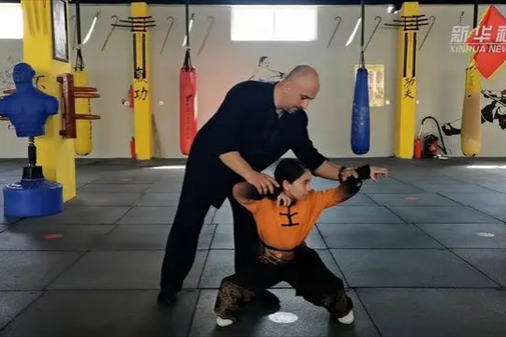In the following years, he returned to China multiple times for advanced training, and in 2017 he founded the Shaolin Martial Arts Club in Sulaymaniyah, where he not only teaches martial arts but also introduces Chinese culture to his compatriots.
Since then, more than 3,000 martial arts enthusiasts, from children to seniors, have been enrolled in Iraqi schools.
Solan, a 59-year-old martial arts enthusiast, said his 15-year martial arts journey has taught him that the essence of Chinese kung fu is not about fighting, but about facing one's inner fears.
“Learning martial arts has given me a deeper understanding of Chinese culture. The aim of martial arts is not to dominate or intimidate others, but to cultivate strong character with self-confidence, self-reliance, open-mindedness and tolerance,” Solan said, adding that this is in line with China's image on the international stage.
Daniel, 17, who was born in Shenzhen, Guangdong province, and lived in China for five years before returning to Iraq with his parents, often reminisces about his childhood in China.
“I was always looking for a way to relive my memories in China and then I found this martial arts club, which helped me reconnect with China. Learning martial arts is hard work, but it teaches me discipline and the perseverance to never give up,” he said.
The club founder is happy that many Iraqis have developed a strong interest in China's development and culture through martial arts. In his view, Chinese kung fu is not only a bridge between China and Iraq, but also a window for Iraqis to understand Chinese culture.
“Chinese people often say 'martial arts make friends,' which reflects the openness of Chinese civilization to cultural exchange,” he said. “Martial arts not only strengthen the body, but also bring people closer together. Iraq and China have become closer thanks to martial arts, despite the great distance between them.”
Xinhua News Agency

